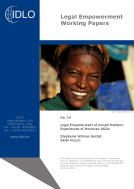Legal Empowerment of Unwed Mothers: Experiences of Moroccan NGOs
| Attachment | Size |
|---|---|
| LEWP_BordatKouzzi.pdf | 278.7 KB |

This paper by Stephanie Willman Bordat and Saida Kouzzi is part of the IDLO book series Lessons Learned: Narrative Accounts of Legal Reform in Developing and Transition Countries. The term “unwed mother” is used here to refer to women who have children outside the framework of legal marriage. They and their children – defined by law as “illegitimate” – are among the most legally and socially marginalized people in the Middle East and North Africa (MENA) region, not just in Morocco.
Unwed mothers and their children are not legally recognized because they lack the legal identity necessary to assert a host of other fundamental rights; at best, neither officially exists; at worst, unwed mothers can be and often are criminally prosecuted for having had sexual relations outside of marriage. This legal invisibility combined with social taboos result in a complete absence of any reliable statistics on numbers of unwed mothers and their children in Morocco, with the few available sources conveying primarily sensationalist and anecdotal information. One article claims that in 2003 in Casablanca, there were 5,000 unwed mothers, although this is clearly underestimated given the current Moroccan administrative and social context.
Full document is attached


